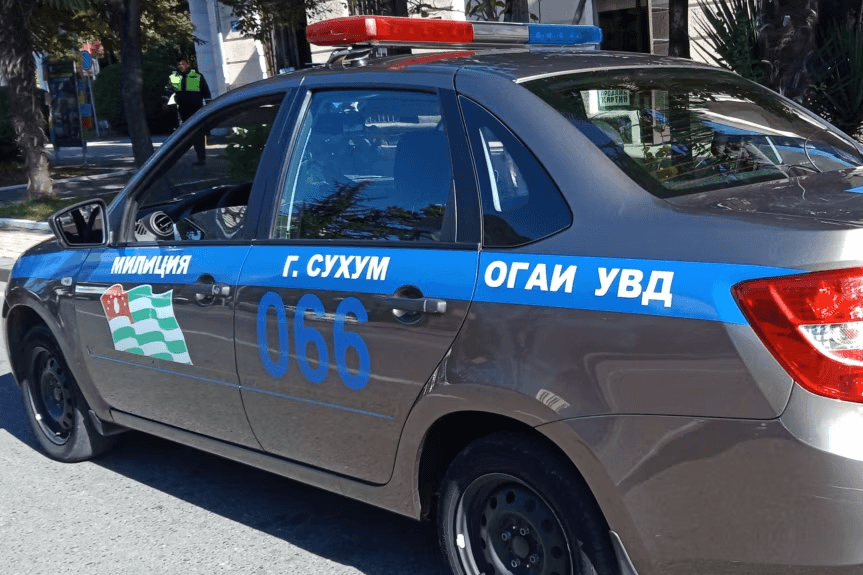
Georgian President Salome Zurabishvili’s expression of support for an anti-government protest in Abkhazia and their alleged objections to Russia, in a speech at the European Parliament in Brussels, was condemned by Abkhazia’s government and opposition.
Ending a 13-year hiatus since a Georgian president had last addressed the European Parliament, Zurabishvili spoke in Brussels on Wednesday, discussing Georgia’s ‘European path’, arguing for Georgia to be granted EU candidate status, and suggesting that this was particularly pressing in light of Russia’s invasion of Ukraine.
Zurabishvili ended her 39-minute speech by stating that her plea for a ‘European future’ for Georgia, was also a plea for people in Abkhazia and South Ossetia.
‘This future is for them too the only one that will ensure their freedom, their protection, and their identity. And I stand with those who demonstrated yesterday in Sokhumi, Abkhazia under the banner “Abkhazia is not for sale, we will not concede to the Russians”!’ she said, referring to Tuesday’s opposition protest in Abkhazia’s capital.
On 30 May, Abkhazian opposition activists gathered in Sukhumi (Sukhum) and presented President Aslan Bzhaniya with a list of demands, which included the government’s resignation and the withdrawal of both a controversial law on apartments and the Pitsunda state dacha deal with Russia.
[Read on OC Media: Opposition rally in Sukhumi ends peacefully despite high security]
However, a few hours after Zurabishvili’s speech in Brussels, Abkhazia’s opposition published a joint statement in which they categorically rejected Zurabishvili’s comments, and denied that demonstrators had expressed that they would not ‘concede to the Russians’.
‘Manipulation is a favourite pastime of Georgian politicians, the purpose of which is to drive a wedge into the well-established, strong interstate relations between Abkhazia and Russia’, reads the statement. ‘In the Republic of Abkhazia, there is not and will not be anti-Russian sentiment either in the public or in the political environment’.
The statement went on to suggest that Zurabishvili use her position to initiate the recognition of Abkhazia as a state and Abkhazian passports, and abolish Georgia’s law on occupied territories, ‘if [she] cares so much about the citizens of Abkhazia and their rights’.
‘Resolving these issues will allow us to begin the process of establishing normal interstate relations’.
An Abkhazian journalist, speaking on condition of anonymity, told OC Media on 1 June that Abkhazia’s opposition political movements were ‘as pro-Russian as the government’.
On the same day, Abkhazia’s Foreign Ministry spokesperson, Viktoria Malania, commented on the speech, noting ‘the inadmissibility of interfering in the internal political agenda of sovereign Abkhazia’.
‘In addition, if Salome Zurabishvili is so concerned about the fate of the citizens of Abkhazia, we recommend that you influence the Government of Georgia so that the agreement on the non-use of force between Abkhazia and Georgia is signed’, wrote Malania. ‘What could be more important than safety, right?’
‘A softer tone’
In Georgia, Salome Zurabishvili’s speech received a muted if positive response from both government and opposition.
Mamuka Mdinaradze, the chair of Georgian Dream’s parliamentary faction said that the tone of the president’s speech had been ‘softened’ in light of the context in which she was speaking.
He noted, however, that speeches made within Georgia were also accessible outside of the country.
‘Therefore, a different speech here, a relatively balanced speech there […] it doesn’t matter where it takes place. Partners hear all of this’, said Mdinaradze.
Chair of the Republic Party, Khatuna Samnidze, noted a similar shift in tone, stating that ‘it is impossible to be as critical outside the country as you are inside the country’.
‘The president would not start talking about internal processes and conflicts from the European tribune, where she should talk about the country’s interests’, said Samnidze.
While Davit Usupashvili, MP of the opposition party Lelo, called Zurabishvili’s speech ‘a step forward on the country’s path of European integration’, other opposition politicians noted that their expectations were not fully met.
Independent MP, Khatia Dekanoidze said that while the president’s speech was ‘good, […] the most important thing that I was missing, and I was waiting for it, is what steps she will take so that Russia does not get a foothold in Georgia, there is no political and economic expansion of Russia and there is media freedom’.
For ease of reading, we choose not to use qualifiers such as ‘de facto’, ‘unrecognised’, or ‘partially recognised’ when discussing institutions or political positions within Abkhazia, Nagorno-Karabakh, and South Ossetia. This does not imply a position on their status.









